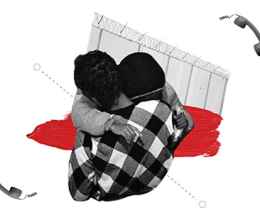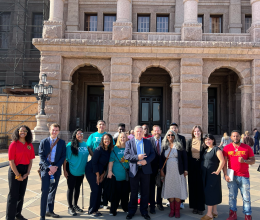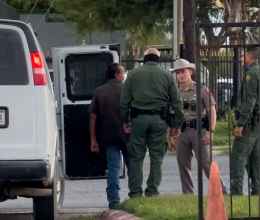
ACLU Affiliates Send Advisements to 100+ Healthcare Facilities Detailing Rights of Hospital Personnel not to Condone Invasive Searches Requested by CBP Agents
HOUSTON – Today, the ACLU of Texas and the ACLU of New Mexico announced a record settlement in which U.S. Customs and Border Protection (CBP) paid a New Mexico woman $475,000 for illegally subjecting her to vaginal and anal searches after she was detained at the Cordova Bridge point of entry in El Paso.
Also today, the four ACLU affiliates at the nation’s Southwest border dispatched letters to 40 healthcare providers that cover 110 facilities — from San Diego to Houston—detailing the rights and responsibilities of hospital personnel when confronted by federal agents who request they perform invasive and illegal body cavity searches. Last year the University Medical Center of El Paso paid the same woman — referred to in the lawsuit as Jane Doe to protect her privacy — a $1.1 million settlement for its collusion in the invasive searches.
“While we are pleased to have obtained justice for our client, this is really a victory for residents of border communities, who shouldn’t have to fear interactions with the thousands of border agents in their midst,” said Rebecca Robertson, legal and policy director for the ACLU of Texas. “Of course, this result could not have been achieved without Ms. Doe’s courage and perseverance. Had she succumbed to the threats of CBP agents and remained silent, who knows how many others might have suffered a similarly despicable experience.”
The ordeal began when a drug-sniffing dog allegedly “alerted” on the ACLU’s client as she attempted to return from Mexico to her home in the U.S. Agents subjected her to a strip search at the border station, examining her genitals and anus with a flashlight. No contraband was found. The agents nevertheless transported Ms. Doe to University Medical Center, where over the course of six hours she suffered an observed bowel movement, an X-ray, a speculum exam of her vagina, a bimanual vaginal and rectal exam, and a CT scan. These procedures were conducted without Ms. Doe’s consent or a search warrant.
Having found no contraband, CBP agents offered Ms. Doe a choice to either sign a medical consent form or be billed for the cost of the searches. Ms. Doe refused to sign, and was later billed $5,488.51.
“It is inexcusable that government agents, men and women sworn to uphold and defend the Constitution, violated Ms. Doe in such a horrific manner,” said Peter Simonson, executive director of the ACLU of New Mexico, “This settlement puts border agents on notice that brutality against border residents will not be tolerated, and stands as a reminder to hospitals of their rights and responsibilities towards the communities they serve. No one should ever again have to endure a protracted and agonizing nightmare like Ms. Doe did.”
“Doctors and law enforcement officers are entrusted with the sacred responsibility of looking after our health and safety, and Ms. Doe’s unspeakable ordeal represents an unforgivable violation of that trust,” said Terri Burke, executive director of the ACLU of Texas. “These atrocities were committed with our money and in our name, and it’s not enough to hold those who committed them to account. We must also ensure that that every law enforcement officer and every hospital staff member understands the consequences of so intimately and egregiously violating someone’s rights.”
In addition to the financial award, the settlement requires CBP to undertake additional training for hundreds of line officers and supervisors. There are currently tens of thousands of federal agents deployed to the Southwest border and calls by some lawmakers to swell the ranks further.
This settlement is one of the largest of its kind ever reached over violations involving an individual search. Ms. Doe is deeply traumatized by her experience and continues to suffer emotional and psychological after effects.
A copy of the original complaint, sample letter from ACLU affiliates to hospitals, and full list of hospitals receiving the advisement may be found below.






